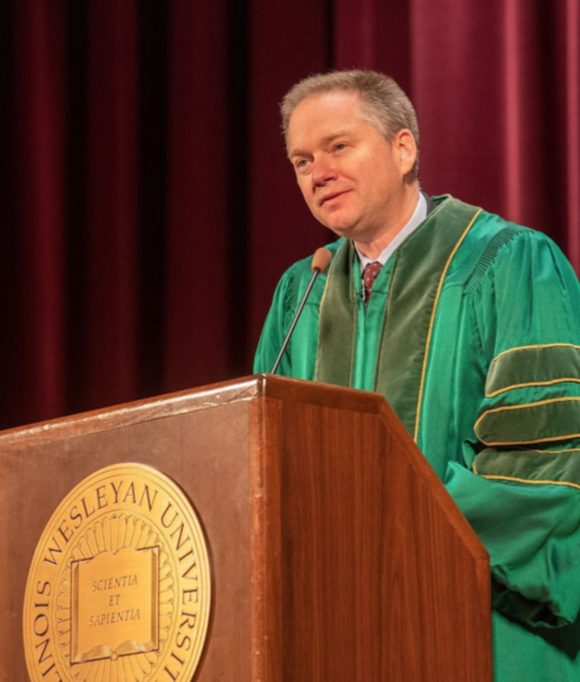
KATIE FATA, NEWS EDITOR
Publisher and Executive Editor of Crain’s Chicago Business Jim Kirk shared remarks on the new age of journalism at Illinois Wesleyan’s Founders’ Day convocation on Wednesday, Jan. 15.
His speech, titled “The Future of Journalism in the Fake News Era,” covered both his experience in the news industry and his predictions for the future of news.
Kirk’s remarks followed President Georgia S. Nugent’s recount of the University founders original hopes for the school which included to one day educate honest and bright students.
“This is the age of improvement,” Nugent said.
Kirk started his speech by presenting the audience with three recent news stories and asking them to identify whether they were fact or fiction.
He shared the story of a police officer who received a cup from McDonald’s with the word “pig” scrawled on it, DNC servers being moved to Ukraine, and a gynecologist at USC who was accused of sexually abusing hundreds of patients. The audience’s guesses were mostly correct, with only the latter being true.
“I should know. I was a part of it,” Kirk said.
Kirk served as Interim Editor and Editor-in-Chief of the Los Angeles Times when the story broke and the journalists involved won the 2019 Pulitzer Prize for investigative reporting.
Kirk moved on to speak about the current political climate’s impact on the news industry, citing tweets specifically.
“The news industry has al- ways been trusted to tell the truth and is now in uncharted territory,” Kirk said, “because for decades, journalism was fairly straightforward.”
Kirk argued that though social media has plagued trust- worthy news in the past, it could be the key to bringing fact back to journalism.
He noted that social media platforms should move toward keeping users accountable after Facebook’s announcement that they would not be policing fake news circulation around the upcoming presidential election.
Kirk also pushed for news organizations to do their part in working towards transparency by including “background boxes” attached to their stories that tell the audience where they are getting their information and how they received it.
Nugent’s remarks on the age of improvement hold true, according to Kirk, who said that the current fight between fact and fiction has made “real” journalists better.
Recalling The New York Times’ 2017 commercial in which the organization detailed the difficulty of finding the truth in an age where fact and fiction look identical.
Kirk pushed the audience to ask for similar movements from the news organizations they subscribe to advocate for increased transparency within the field of journalism.
“No one wants to be lied to,” Kirk said.
